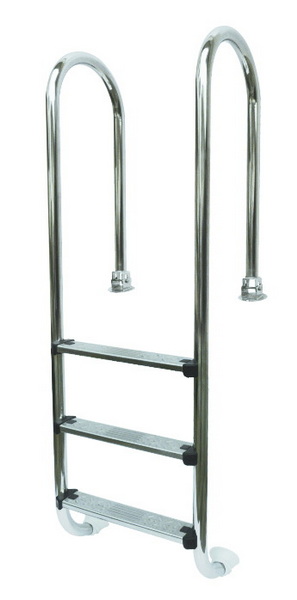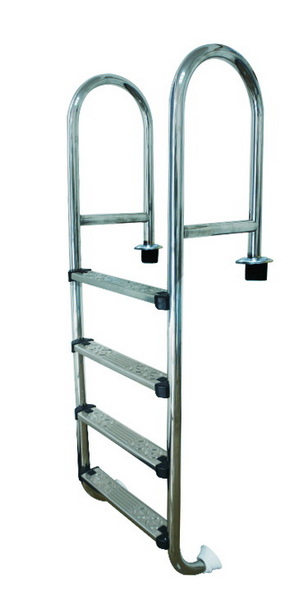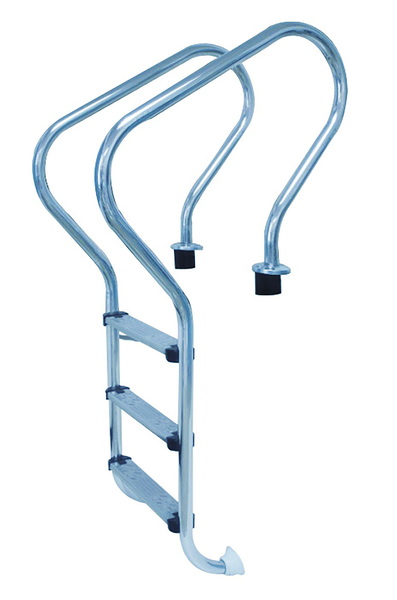Views: 222 Author: Tina Publish Time: 2025-10-21 Origin: Site








Content Menu
● Why Cleaning and Maintaining Your Pool Ladder Matters
● Step 1: Removing the Ladder from the Pool
● Step 2: Choosing the Right Cleaning Solutions
● Step 5: Stabilizing and Reinstalling the Ladder
● How to Remove and Store Your Pool Ladder for Winter
>> 1. How often should I clean my above ground pool ladder?
>> 2. What is the safest cleaner for plastic ladder steps?
>> 3. How do I remove rust from metal parts?
>> 4. Can I use bleach to clean my ladder?
>> 5. How do I stabilize a wobbly ladder?
Maintaining a clean and safe above ground pool ladder is essential for the longevity of your pool equipment and the safety of all swimmers. Pool ladders face constant exposure to water, chemicals, sunscreen, algae, and grime, causing accumulation of dirt, rust, mildew, and slippery surfaces. This comprehensive guide offers step-by-step instructions on cleaning, maintaining, stabilizing, and storing your pool ladder effectively. Following these tips will ensure your ladder remains safe, durable, and visually appealing for many seasons.

Pool ladders are exposed to harsh pool environments daily. If not cleaned and maintained regularly:
- Slippery Steps Can Cause Accidents: Algae and grime reduce traction.
- Rust and Corrosion Damage Metal Parts: Leading to weak ladders and structural failure.
- Unsightly Build-up Affects Pool Aesthetics: Dirt, scale, and discoloration degrade appearance.
- Loose or Damaged Components Create Safety Hazards.
By cleaning and maintaining regularly, you prevent these problems, prolong ladder life, and keep swimmers safe.
- Loosen anchor bolts or pins carefully.
- Remove the ladder and place it on a flat, stable surface.
- Rinse with clean water to wash off loose debris.
Removing the ladder allows thorough cleaning and prevents mess around the pool.
Depending on dirt and stains, select appropriate cleaners:
- Mild dish soap with water: For everyday dirt and light grime.
- White vinegar or diluted muriatic acid: To dissolve calcium deposits and hard water scale.
- Baking soda paste: For scrubbing rust spots gently.
- Enzyme-based pool cleaners: Safe for removing algae on plastic parts.
Always test cleaners on a hidden area before full application to prevent damage.
- Use a soft brush or non-abrasive scrub pad.
- Avoid steel wool or harsh abrasives that scratch surfaces.
- Apply cleaning solution and let it soak on stubborn spots before scrubbing.
- Pay attention to steps, handrails, joints, and all crevices.
- For rails and removable parts, clean separately if possible.
- Rinse thoroughly with fresh water to remove all cleaning agents.
- Dry completely with towels to prevent water spots and rust.
- Inspect for missed spots and repeat cleaning if required.
Thorough drying slows corrosion and maintains the ladder's finish.
Proper installation is crucial for safety:
- Follow manufacturer instructions carefully.
- Tighten all bolts and nuts securely, using a power drill if available.
- Use a 4-foot level to check the ladder rests evenly.
- Apply silicone sealant around mounting brackets to prevent loosening.
- If wobbling occurs, add supports like foam pool noodles under ladder legs or weighted sandbags for extra stability.
- For deck-mounted ladders, anchor every bolt hole and consider concrete bases for long-term security.

- Regular Inspection: Check bolts, screws, welds, rubber feet, and handrails monthly.
- Clean Frequently: Rinse after each pool use and perform deep cleaning monthly.
- Address Rust Early: Use baking soda or rust remover and repaint if necessary.
- Lubricate Moving Parts: If your ladder has hinges or locking parts, use silicone spray.
- Protect Metal Surfaces: Apply corrosion-resistant coatings suitable for pool environments.
- Maintain Pool Chemistry: Balanced water chemistry reduces scale and corrosion buildup.
- Store Properly in Off-Season: Dry thoroughly and store in a dry, covered place to prevent damage.
- Let the ladder dry in the sun 1-2 days before disassembling.
- Follow the manufacturer's disassembly instructions precisely.
- Remove bolts and parts carefully to avoid damage.
- Inspect all components for wear or damage and replace as needed.
- Store hardware in labeled bags with instructions for easy reassembly.
- Keep the ladder in a dry, sheltered location covered with a tarp or protective cover.
Cleaning and maintaining your above ground pool ladder regularly is key to safety, durability, and aesthetics. By removing the ladder for deep cleaning, choosing the right cleaning agents, scrubbing carefully, and drying thoroughly, you prevent buildup of algae, rust, and scale. Stabilizing and correctly reinstalling the ladder ensures safe, slip-free pool access. Consistent inspection and upkeep extend the ladder's lifespan, making your pool a safer and more enjoyable place all season long.

Clean every 2-4 weeks and always at the start and end of the swimming season.
A mild dish soap solution or an enzyme-based cleaner is safest.
Use a baking soda paste or specialized rust remover with a soft brush.
Bleach is harsh and may damage finishes; gentler cleaners are recommended.
Add foam pool noodles under legs or anchor with sandbags; ensure all bolts are tightened securely.
[1](https://blog.watsons.com/blog/stabilize-above-ground-pool-ladder)
[2](https://www.mavaquadoc.com/blogs/pool-maintenance-blog/how-to-maintain-and-clean-your-pool-ladder)
[3](https://sternspools.com.au/blogs/help-advice/easy-access-a-guide-to-above-ground-pool-ladders)
[4](https://georgiapoolcleaning.com/how-to-clean-and-maintain-pool-ladders-and-rails/)
[5](https://www.swimmingpool.com.sg/articles/tips-for-cleaning-pool-steps-and-ladders.html)
[6](https://newcastleswimmingpools.com/swimming-pool-ladder-maintenance-tips/)
[7](https://truebluepoolslex.com/above-ground-pool-maintenance-guide-checklist/)
[8](https://www.facebook.com/groups/637529959937311/posts/2642320976124856/)
[9](https://www.poolwarehouse.uk.com/wp-content/uploads/2019/03/ladder-owners-manual-28076.pdf)
[10](https://www.facebook.com/groups/637529959937311/posts/2219515431738748/)
This article introduces leading Pool Filter Valve Manufacturers and Suppliers in Japan and Asia, covering valve types, key Japanese pool brands, OEM opportunities, and application segments. It explains how advanced engineering, strict quality control, and strong visual marketing help exporters win global pool projects.
This article introduces the main types of Pool Filter Valve Manufacturers and Suppliers serving Russia, including local distributors, industrial filter producers, global brands, and Chinese OEM partners. It explains key selection criteria, product ranges, and OEM opportunities for Russian pool projects.<br />
This article introduces the leading Pool Filter Valve Manufacturers and Suppliers in Australia, explains common valve types and technical features, highlights major distributors and OEM opportunities, and offers practical tips for international buyers sourcing compatible filtration valves and systems.
This article introduces Italy’s leading Pool Filter Valve Manufacturers and Suppliers, detailing their technologies, materials, OEM services, and application scenarios. It explains how Italian valves integrate with sand, DE, and cartridge filters and why global brands choose Italian partners for premium pool filtration solutions.<br />
This article introduces the Portuguese market for pool filtration equipment and highlights how local specialists, European brands, and Chinese OEM Pool Filter Valve Manufacturers and Suppliers cooperate to serve residential and commercial pools, offering multiport valves, filters, pumps, and customized OEM solutions.<br />
This article explains whether you can safely use pool filter sand in an aquarium, covering sand types, preparation, pros and cons, plant and fish compatibility, maintenance tips, and alternatives. It helps hobbyists choose and manage substrate using pool-grade filtration media.
This article explains when to backwash a pool filter using pressure readings, water clarity and flow as guides. It covers sand and DE filter schedules, backwash steps, common mistakes, troubleshooting cloudy water, and how OEM sand filter systems can simplify maintenance for global pool owners.<br />
This article explains what pool filter balls are, how they work, and why they are an increasingly popular alternative to sand in residential pool filters. It covers benefits, installation, maintenance, compatibility, and OEM opportunities for brands seeking high‑performance filtration solutions.<br />
This article explains how often to change a pool filter cartridge, covering typical 1–3 year lifespans, signs of wear, and factors like usage, climate, and maintenance. It shows how cleaning frequency, pressure readings, and water clarity guide replacement and highlights the value of OEM cartridge solutions.
This article explains how often to change a pool filter cartridge, covering typical 1–3 year lifespans, factors that affect replacement timing, and clear signs of wear. It outlines cleaning versus replacement, residential vs commercial schedules, and highlights OEM cartridge solutions for complete pool filtration systems.<br />
Learn how to remove a stuck inground pool ladder step‑by‑step, from releasing anchor wedges and dissolving mineral buildup to using safe, controlled force and seasonal maintenance. Discover tools, safety tips, and prevention methods to protect your rails, anchors, and pool deck.<br />
This guide explains how to remove a corroded pool ladder step by step, from safety prep and penetrating oil to leverage, heat and cutting as a last resort. Learn how to clean and restore stainless steel, prevent future corrosion and decide when to replace the ladder for long‑term pool safety.<br />
Reinforce a pool ladder the right way with solid base leveling, secure deck anchors, safe weighting, better traction, and corrosion control. Learn practical DIY methods, maintenance tips, and safety standards to make above‑ground and in‑ground pool ladders sturdier and safer for every swimmer.<br /> <br />
This guide explains how to put up a pool ladder safely, covering ladder types, tools, and step‑by‑step installation for above‑ground and in‑ground pools. It also details stability tips, safety checks, maintenance advice, and multimedia ideas to help users install ladders with confidence.<br /> <br />
This in-depth guide shows how to put together a Vinyl Works pool ladder step by step, from sorting parts to final safety checks. It covers tools, ballast, handrails, mounting to pool or deck, gate installation, maintenance tips, and a clear FAQ to help owners assemble with confidence.<br />
Replacing a pool pump typically costs $300–$1,600, depending on pump type, size, and labor. Learn what affects pool pump replacement cost, the benefits of variable‑speed pumps, and how OEM pool equipment solutions help brands and distributors control price and quality.<br /> <br />
Learn how to wire a pool pump safely with the right voltage, breaker, wire size, GFCI protection, grounding, and bonding. Step‑by‑step guidance, testing tips, and FAQs help homeowners, installers, and OEM buyers ensure efficient, code‑compliant pool circulation systems.<br />
Learn how to replace a swimming pool pump motor step by step, from shutting off power and disassembling the pump to installing a new motor, wiring it safely, and testing for leaks. Ideal for DIY pool owners and OEM buyers seeking reliable filtration solutions.<br />
This in‑depth guide explains how to safely remove a motor from a pool pump, from shutting off power and draining the system to disconnecting wiring, separating the motor, and inspecting seals, while also highlighting OEM pool pump and filtration solutions for global brands.<br />
This article explains whether a pool pump must run all the time, how many hours per day are recommended, and how factors like filter type, climate, and variable speed pumps affect run schedules. It also highlights how a professional Chinese OEM factory supplies complete pump and filter solutions.<br />
